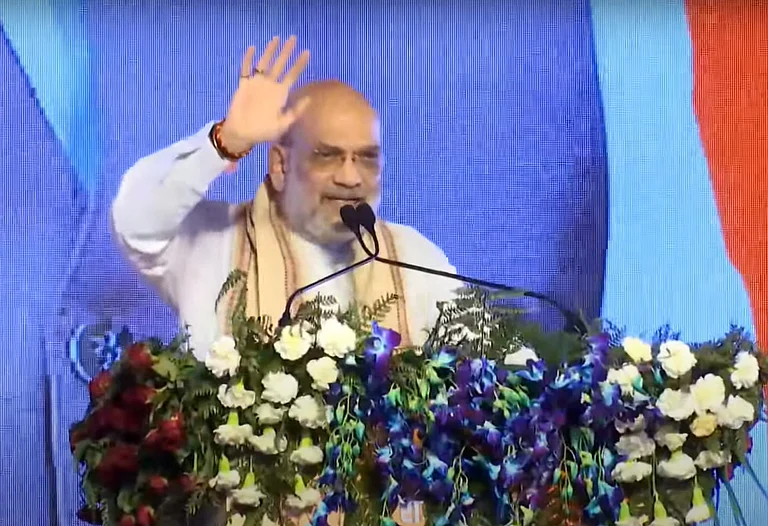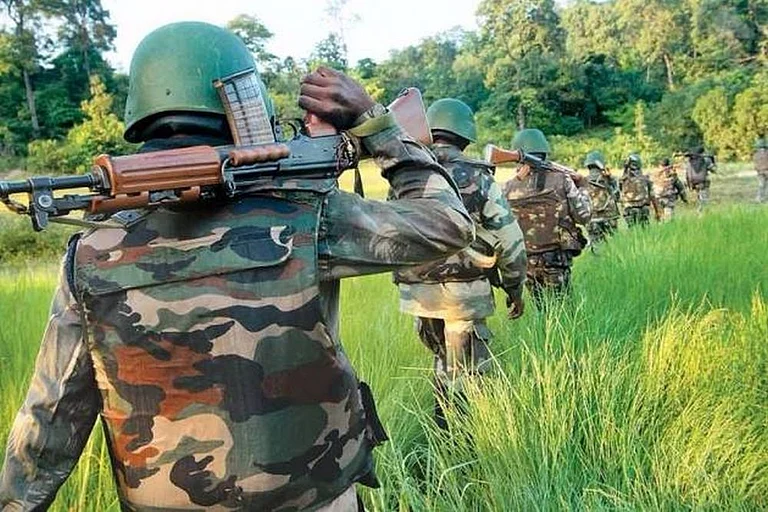Reports of Naxal encounters have emerged from Chhattisgarh and Telangana over the past week, with a total of 15 militants confirmed dead. On Thursday, police engaged in a gunfight with Naxals in Bhadradri Kothagudem district of Telangana, resulting in the death of six militants. The previous day, nine Naxals were killed in an encounter in the Bastar region of Chhattisgarh.
The news of the encounters come in the wake of Home Minister Amit Shah's commitment at a review meeting last month to "completely eradicate Naxalism from the country before March 2026." Shah emphasised that the Modi government had been making significant strides in combating Left-wing extremism, with the issue now largely confined to a few pockets in Chhattisgarh. He said that over the past seven months, the Chhattisgarh government had successfully neutralised a record number of Naxalites, facilitated a significant number of surrenders, and made numerous arrests.
In April, the Border Security Force (BSF) and the District Reserve Guard (DRG) carried out a joint operation in Kanker, resulting in the deaths of 29 Naxals, the largest number of Naxal casualties recorded in a single encounter in the history of Chhattisgarh's anti-Naxal movement. One of the insurgents’ top leaders is believed to have been killed in the encounter.
In an interview with India Today following the encounter, Amit Shah stated that the crackdown on Naxalites had intensified since the BJP took over the Chhattisgarh government in 2023. "Naxalism is now limited only to four districts in Chhattisgarh. For five years, the Congress government in the state did not properly cooperate with us. When the government changed, the priority changed and within 90 days, we have killed 86 Naxals, arrested 126 and over 250 have surrendered," Amit Shah said.
The killings were carried out under Operation Prahar, a joint mission by the CRPF and Chhattisgarh Police aimed at removing Naxalite extremists from their hideouts, primarily targeting the Bastar region.
Launched in 2017, Operation Prahar builds on previous government efforts against Left-wing extremism, including Operation Green Hunt, Hill Vijay, Samadhan-Prahar, and Thunder. While Prahar is considered one of the most effective operations to date, it has faced criticism for inadequate planning and coordination, and for impacting peaceful activists advocating for tribal rights.
Since assuming power in Chhattishgarh in 2023, the BJP has significantly intensified its offensive against Naxalites, setting up 32 police camps in Maoist hotspots in just five months, compared to the usual 16-17 camps annually. The government is also improving infrastructure, including roads and telecom towers, and has established over 20 new security camps in key Maoist areas like Abujhmaad, enhancing intelligence, force mobility, and pursuit capabilities, as per India Today reports.
The government’s no-holds-barred approach comes after the security forces suffered major losses in the previous years with the Home Ministry vowing a “befitting reply”.
Naxalism in India began with the Naxalbari uprising in 1967 in North Bengal led by a group of peasants, labourers, and tribal people seeking to redistribute land from wealthy landowners to the landless. Influenced by Marxist-Leninist-Maoist ideologies, the movement aimed to address socio-economic inequalities and establish a classless society through armed struggle. Over time, the movement evolved and expanded, with several factions merging into the CPI (Maoist) in 2004, which became the main organisation representing Naxalite groups by 2008. The government under the Unlawful Activities Prevention Act (UAPA), 1967 amended in 2004 had banned the Communist Party of India (Marxist-Leninist) People's War and all its associated formations, and the Maoist Communist Centre (MCC) and its front organisations. In 2009, the government confirmed that their merged entity, CPI (Maoist), was also banned and added it in writing to the schedule to avoid any ambiguity.
At their peak, when Naxalites were active in over 200 districts, then Prime Minister Manmohan Singh had described the Maoist movement as “the single biggest internal-security challenge” India faced. Reiterating the PM’s concerns, then Home Minister P Chidambaram urged the states to act in cooperation with the Centre. He urged states to strengthen their response to the Maoist threat, specifically recommending the recruitment and training of police personnel to fill significant vacancies and enhance local policing.
This insurgency primarily affected the eastern, central, and southern parts of India, which were collectively known as the 'red corridor'. The corridor included 108 districts of 11 states covering Nepal, Bengal, Jharkhand, Chhattisgarh, UP, Madhya Pradesh, Odisha, Andhra Pradesh, Telangana, Karnataka, Tamil Nadu and Gadchiroli district of Maharashtra. However, over the years the Naxalite hold has shrunk to 60 districts of 8 States – West Bengal (8), Jharkhand (14), Bihar (5), Chhattisgarh (10), Andhra Pradesh (8), Madhya Pradesh (8), Odisha (5) and Maharashtra (2), with Chhattisgarh still the epicentre of Maoist activities.
According to the South Asian Terrorism Portal (SATP), between 2000 and 2024, a total of 4,515 Maoist insurgents have been killed across India, with 199 alone in 2024 (till September 8). Additionally, the conflict has claimed the lives of 6,742 civilians and security personnel.
In April 2021, security forces launched an operation in the South Bastar forests, a known Maoist stronghold. The gunfight, which occurred along the border between Bijapur and Sukma districts in Chhattisgarh, resulted in the deaths of 22 personnel from various security forces and left 30 others injured.
Home Minister Amit Shah offered condolences to the fallen securitymen and said, "Our securitymen have lost their lives, we will not tolerate this bloodshed and a befitting reply will be given at an appropriate time.”
And in April, 2023, after a lull of over two years, Maoists triggered an IED in Dantewada district of south Chhattisgarh, over 350 km from the state capital Raipur. The attack killed ten jawans of the District Reserve Guard (DRG) and their driver, who were returning in a van from a security operation.
Union Minister Amit Shah took stock of the situation and assured “all possible assistance to the state government” following the “cowardly attack on Chhattisgarh police”.

























